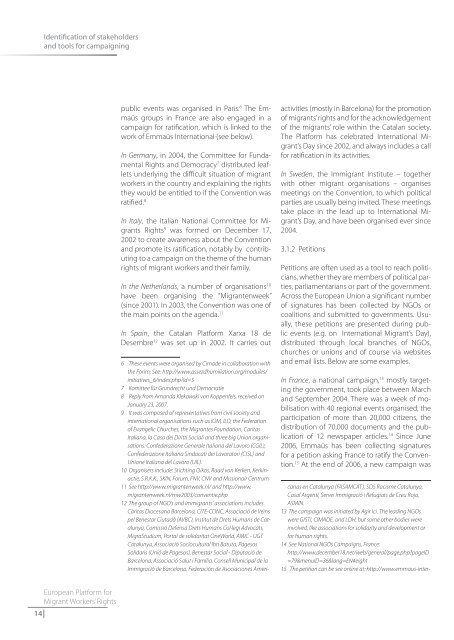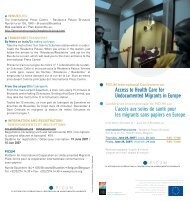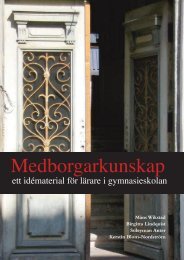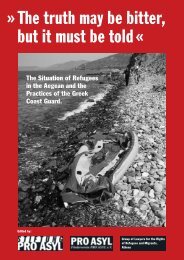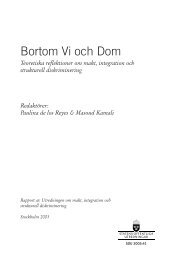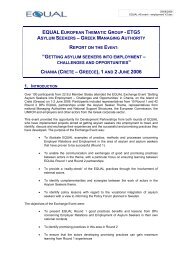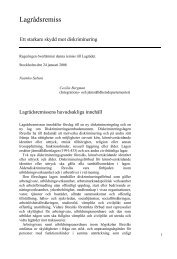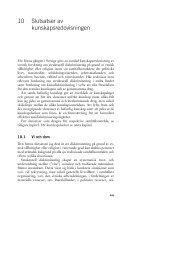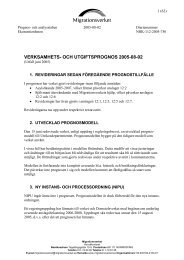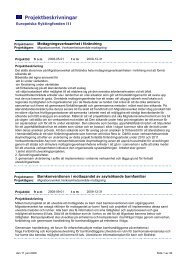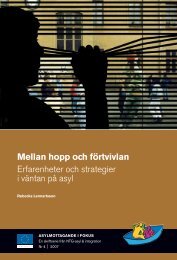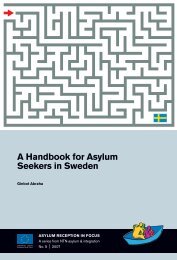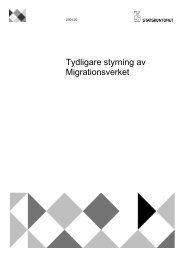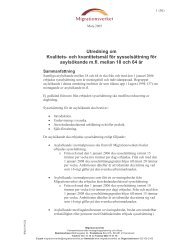The UN Migrant Workers Convention: Steps Towards Ratification
The UN Migrant Workers Convention: Steps Towards Ratification
The UN Migrant Workers Convention: Steps Towards Ratification
You also want an ePaper? Increase the reach of your titles
YUMPU automatically turns print PDFs into web optimized ePapers that Google loves.
Identification of stakeholders<br />
and tools for campaigning<br />
public events was organised in Paris. <strong>The</strong> Emmaüs<br />
groups in France are also engaged in a<br />
campaign for ratification, which is linked to the<br />
work of Emmaüs International (see below).<br />
In Germany, in 2004, the Committee for Fundamental<br />
Rights and Democracy distributed leaflets<br />
underlying the difficult situation of migrant<br />
workers in the country and explaining the rights<br />
they would be entitled to if the <strong>Convention</strong> was<br />
ratified. <br />
In Italy, the Italian National Committee for <strong>Migrant</strong>s<br />
Rights was formed on December 17,<br />
2002 to create awareness about the <strong>Convention</strong><br />
and promote its ratification, notably by contributing<br />
to a campaign on the theme of the human<br />
rights of migrant workers and their family.<br />
In the Netherlands, a number of organisations 10<br />
have been organising the “<strong>Migrant</strong>enweek”<br />
(since 2001). In 2003, the <strong>Convention</strong> was one of<br />
the main points on the agenda. 11<br />
In Spain, the Catalan Platform Xarxa 18 de<br />
Desembre 12 was set up in 2002. It carries out<br />
<strong>The</strong>se events were organised by Cimade in collaboration with<br />
the Forim; See: http://www.assezdhumiliation.org/modules/<br />
initiatives_6/index.php?id=5<br />
Komittee für Grundrecht und Democratie<br />
Reply from Amanda Klekowski von Koppenfels, received on<br />
January 23, 2007.<br />
It was composed of representatives from civil society and<br />
international organisations such as IOM, ILO, the Federation<br />
of Evangelic Churches, the <strong>Migrant</strong>es Foundation, Caritas<br />
Italiana, la Casa dei Diritti Sociali and three big Union organisations:<br />
Confederazione Generale Italiana del Lavoro (CGIL),<br />
Confederazione Italiana Sindacati dei Lavoratori (CISL) and<br />
Unione Italiana del Lavoro (UIL).<br />
10 Organisers include: Stichting Oikos, Raad van Kerken, Kerkinactie,<br />
S.R.K.K., SKIN, Forum, FNV, CNV and Missionair Centrum<br />
11 See http://www.migrantenweek.nl/ and http://www.<br />
migrantenweek.nl/mw2003/conventie.php<br />
12 <strong>The</strong> group of NGO’s and immigrants’ associations includes<br />
Càritas Diocesana Barcelona, CITE-CONC, Associaci de Veïns<br />
pel Benestar Ciutadà (AVBC), Institut de Drets Humans de Catalunya,<br />
Comissi Defensa Drets Humans Col·legi Advocats,<br />
MigraStudium, Portal de solidaritat OneWorld, AMIC - UGT<br />
Catalunya, Associaci Sociocultural Ibn Batuta, Pagesos<br />
Solidaris (Uni de Pagesos), Benestar Social - Diputaci de<br />
Barcelona, Associaci Salut i Família, Consell Municipal de la<br />
Immigraci de Barcelona, Federacin de Asociaciones Ameriactivities<br />
(mostly in Barcelona) for the promotion<br />
of migrants’ rights and for the acknowledgement<br />
of the migrants’ role within the Catalan society.<br />
<strong>The</strong> Platform has celebrated International <strong>Migrant</strong>’s<br />
Day since 2002, and always includes a call<br />
for ratification in its activities.<br />
In Sweden, the Immigrant Institute – together<br />
with other migrant organisations – organises<br />
meetings on the <strong>Convention</strong>, to which political<br />
parties are usually being invited. <strong>The</strong>se meetings<br />
take place in the lead up to International <strong>Migrant</strong>’s<br />
Day, and have been organised ever since<br />
2004.<br />
3.1.2 Petitions<br />
Petitions are often used as a tool to reach politicians,<br />
whether they are members of political parties,<br />
parliamentarians or part of the government.<br />
Across the European Union a significant number<br />
of signatures has been collected by NGOs or<br />
coalitions and submitted to governments. Usually,<br />
these petitions are presented during public<br />
events (e.g. on International <strong>Migrant</strong>’s Day),<br />
distributed through local branches of NGOs,<br />
churches or unions and of course via websites<br />
and email lists. Below are some examples.<br />
In France, a national campaign, 13 mostly targeting<br />
the government, took place between March<br />
and September 2004. <strong>The</strong>re was a week of mobilisation<br />
with 40 regional events organised, the<br />
participation of more than 20,000 citizens, the<br />
distribution of 70,000 documents and the publication<br />
of 12 newspaper articles. 14 Since June<br />
2006, Emmaüs has been collecting signatures<br />
for a petition asking France to ratify the <strong>Convention</strong>.<br />
15 At the end of 2006, a new campaign was<br />
canas en Catalunya (FASAMCAT), SOS Racisme Catalunya,<br />
Casal Argentí, Servei Immigraci i Refugiats de Creu Roja,<br />
ASMIN.<br />
13 <strong>The</strong> campaign was initiated by Agir Ici. <strong>The</strong> leading NGOs<br />
were GISTI, CIMADE, and LDH, but some other bodies were<br />
involved, like associations for solidarity and development or<br />
for human rights.<br />
14 See National NGOs Campaigns, France:<br />
http://www.december18.net/web/general/page.php?pageID<br />
=79&menuID=36&lang=EN#eight<br />
15 <strong>The</strong> petition can be see online at: http://www.emmaus-inter-<br />
14<br />
European Platform for<br />
<strong>Migrant</strong> <strong>Workers</strong>’ Rights


